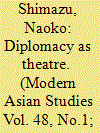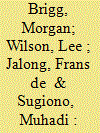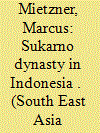|
|
|
Sort Order |
|
|
|
Items / Page
|
|
|
|
|
|
|
| Srl | Item |
| 1 |
ID:
084399


|
|
|
|
|
| Publication |
2008.
|
| Summary/Abstract |
Democracy as political doctrine has its fair share of controversies over the adjudication of rights and the prioritization of the individual over the community. These debates have largely derived from its western genesis. The current stage of global development has however supplied many non-western perspectives on democracy which suggest that any consensus over an identifiable body of democratic thought is likely to witness more sub-diversity than ever before. This article argues that contemporary Asian thinkers on the philosophy of government have a valuable contribution to make to democratic discourse notwithstanding the clichés of the Asian Values debate of the 1990s. By performing a sampled reading of José Rizal, Sukarno and Lee Kuan Yew on their diverse interpretations of guided democracy in a nationalistic context, it will be shown that these three modern Southeast Asian political thinkers would offer some tentative Asian insights on the democracy of dignity and of responsibility.
|
|
|
|
|
|
|
|
|
|
|
|
|
|
|
|
| 2 |
ID:
121237


|
|
|
|
|
| Publication |
2012.
|
| Summary/Abstract |
During the first two decades of the Cold War, especially during the
administration of the United States presidents Dwight D. Eisenhower (1953-
1961) and Lyndon B. Johnson (1963-1969), relations between the US and
Indonesia were marked with suspicion, ambiguity, and antagonism. This
was in part due to the failures of many US policymakers in understanding-
let alone respecting-Indonesia's culture and politics, especially as they
manifested in the political views and personality of Indonesia's first
president, Sukarno. Failing to see Sukarno as a Javanese-Indonesian leader
whose views on domestic and international politics stemmed from his
Javanese background, many Cold War US policymakers considered him a
communist demagogue who threatened US interests and world peace.
|
|
|
|
|
|
|
|
|
|
|
|
|
|
|
|
| 3 |
ID:
131777


|
|
|
|
|
| Publication |
2014.
|
| Summary/Abstract |
As a significant 'moment' in twentieth-century international diplomacy, the rise of post-colonial Afro-Asia at the Bandung Conference of 1955 is replete with symbolic meanings. This paper proposes a conceptual approach to understanding the symbolic dimension of international diplomacy, and does so by ruminating on the newly unearthed Indonesian material on the Bandung Conference. To this end, 'diplomacy as theatre' is introduced as an interpretive framework to re-cast the conference as a theatrical performance, in which actors performed on the stage to audiences. Focusing on the city of Bandung, this paper reconstructs some examples of the 'performative' dimensions of international diplomacy, and elaborates on the notion of 'staging' the city and the role played by the people of Bandung, including the significance of conference venues, as well as the impromptu creation of a ritual citation that contributed to an iconic 'performative act' during the conference. Sukarno, Nehru, Zhou Enlai and Nasser all understood the importance as performers in their role as new international statesmen, representing the esprit de corps of the newly emergent post-colonial world. In deconstructing the symbolic, it will become evident that the role played by Indonesia significantly influenced the underlying script of the diplomatic theatre which unfolded at Bandung.
|
|
|
|
|
|
|
|
|
|
|
|
|
|
|
|
| 4 |
ID:
145527


|
|
|
|
|
| Summary/Abstract |
Indonesia's normative leadership at the 1955 Asian-African Conference was grounded in anti-colonialism that became part of the ‘Bandung spirit’. However, the shape of Indonesia's recent leadership, following its remarkable democratisation, is harder to fathom. In response, this article suggests that Indonesia's regional and international engagements can be usefully understood through the lens of shifting domestic efforts to navigate unity with diversity, including as this is reflected in long-standing foreign policy commitments. Empirical reference points include the management of conflict in the Indonesian democratic transition, the place of civilian militias in Indonesian political life, and the Bali Democracy Forum. The case is made that Indonesia exhibits a remarkable embrace of diversity alongside substantial illiberality—a pattern that generates a flexible form of liberalism which presents difficulties, but also suggests particular opportunities for Indonesian leadership. Considering Indonesian navigation of unity with diversity enables a better understanding of the current and potential future shape of Indonesian leadership than analyses that rely on macro-level expectations of democratisation drawn from dominant liberal understandings of democracy and political order. This is in part because of the continuing salience of commitments to diversity, independence and cooperation that were articulated at Bandung in 1955.
|
|
|
|
|
|
|
|
|
|
|
|
|
|
|
|
| 5 |
ID:
032595


|
|
|
|
|
| Publication |
Princeton, Van Nostrand Company, 1963.
|
| Description |
144p.pbk
|
|
|
|
|
|
|
|
|
|
|
|
Copies: C:1/I:0,R:0,Q:0
Circulation
| Accession# | Call# | Current Location | Status | Policy | Location |
| 000557 | 959.8/HIG 000557 | Main | On Shelf | General | |
|
|
|
|
| 6 |
ID:
101995


|
|
|
|
|
| Publication |
2010.
|
| Summary/Abstract |
AT THE BEGINNING OF 2003, I was lucky enough to prepare and open an exhibition of paintings called "The Russian Collection" at the National Gallery of Indonesia in Jakarta. It was timed to President of the Indonesian Republic Mrs. Megawati Sukarnoputri's visit to Russia.
|
|
|
|
|
|
|
|
|
|
|
|
|
|
|
|
| 7 |
ID:
148550


|
|
|
|
|
| Summary/Abstract |
This article focuses on the history and current political relevance of the Sukarno dynasty in Indonesia. It analyses the reasons for the political longevity of the family, but also discusses internal and external pressures that have forced the dynasty to adopt new strategies to secure its survival. The article tests a number of assertions that political theorists have typically made about dynasties and their political parties: for instance, that they are institutionally weak, electorally unstable and have low levels of representativeness. I argue that the Sukarno family has been able to mitigate most of these much-discussed deficits, but has faced a series of succession crises that, if unresolved, threaten its long-term position in Indonesian politics.
|
|
|
|
|
|
|
|
|
|
|
|
|
|
|
|
|
|
|
|
|